Get to know your faculty
03 March 2021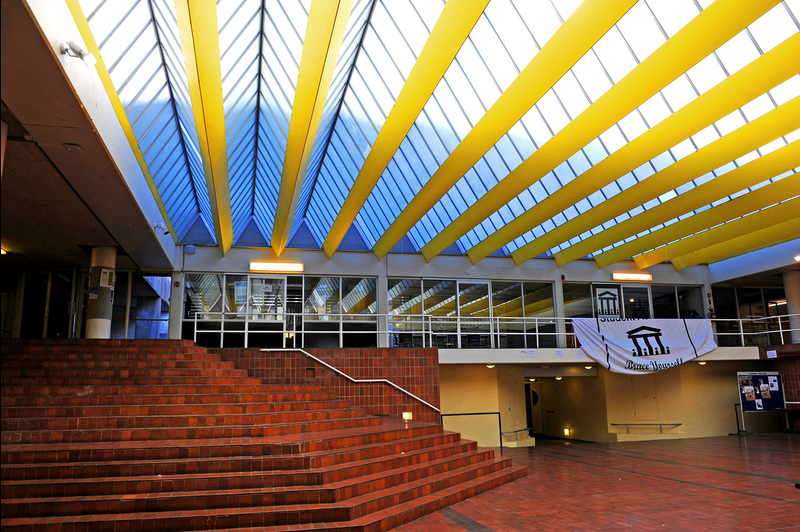
UCT has around 29 000 students who study across six academic faculties, including Commerce, Engineering & the Built Environment, Health Sciences, Humanities, Law and Science. These faculties are ably supported in their teaching and learning by the Centre for Higher Education Development (CHED).
Commerce
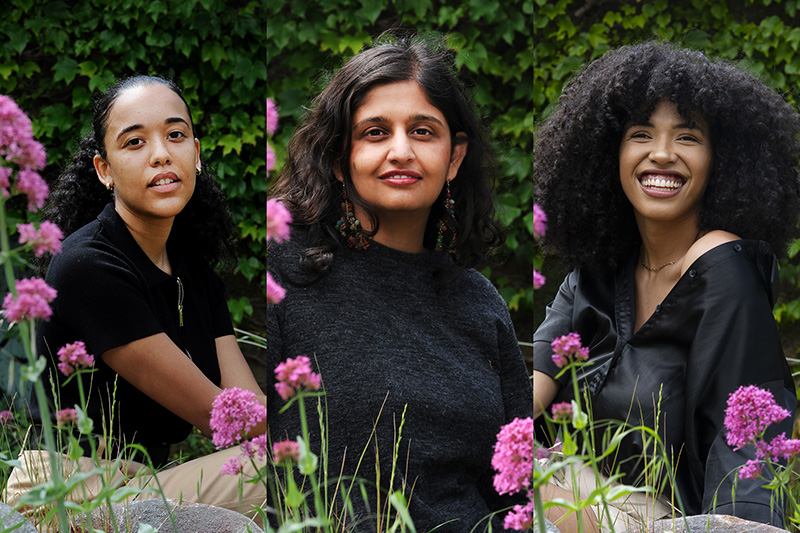
WHO?
With approximately 6 700 students, Commerce offers several undergraduate specialisations, including accounting, actuarial science, computer science, economics, finance, information systems, law, management studies, marketing, organisational psychology, quantitative finance and statistical sciences.
WHAT?
The faculty is home to seven departments and 12 research groups.
WOW!
Launched in 2018, UCT’s School of IT responds to the growing needs of the South African and global tech industry, and the increasing demand for university qualifications in the sector. As an interdisciplinary collaboration that bridges the faculties of Science, Commerce and Humanities, the School of IT offers a wide variety of courses and programmes to cater for students’ personal interests and aptitudes.
WHERE?
Leslie Commerce Building, School of Economics and Linkoping House
021 650 4375
com-faculty@uct.ac.za
Faculty of Commerce website
Engineering & the Built Environment
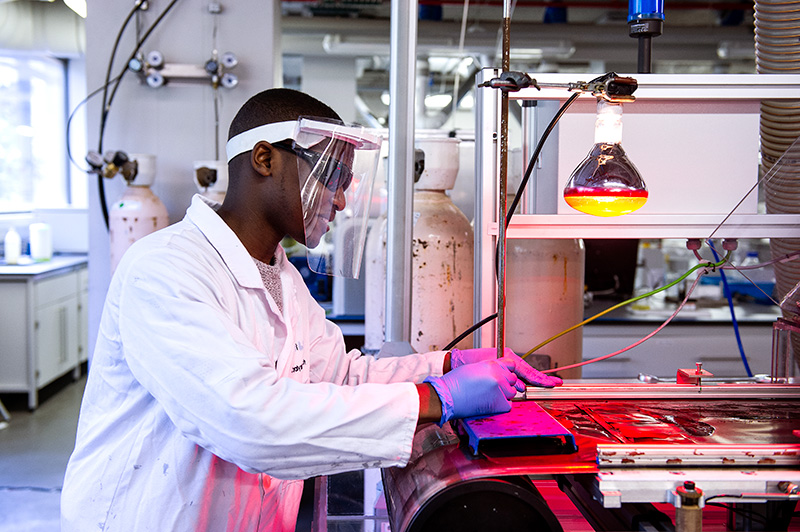
WHO?
With more than 5 000 students and staff, state-of the-art facilities and world-renowned teaching staff, the faculty is home to architects, engineers, planners, quantity surveyors, land surveyors, GIS specialists, and property and construction managers.
WHAT?
The faculty is proud of its 57 National Research Foundation-rated staff members, not to mention its 20 active research groups, covering African urbanism, fuel cells, minerals, biomedical engineering, robotics, alternative energy and more.
WOW!
Students and academics in the faculty remain on the cutting edge of research:
- Baleka – Africa’s first two-legged jumping robot developed in mechatronics – is helping researchers figure out new ways for robots to move.
- Dr Joyce Mwangama, a lecturer in the Department of Electrical Engineering, is leading the development of South Africa’s first university-based 5G testbed facility.
- The world’s first bio-brick grown from human urine was unveiled by students supervised Dr Dyllon Randall, a senior lecturer in water quality engineering, signalling an innovative paradigm shift in waste recovery.
- A green home designed and built by staff and students at UCT and Stellenbosch University was awarded second place in the continent’s first Solar Decathlon Africa in Morocco. The project focused on creating sustainable homes using natural and upcycled materials, solar energy and technically advanced building and energy technologies.
WHERE?
New Engineering Building, Menzies Building, Centlivres and others
021 650 2699
ebe-faculty@uct.ac.za
Faculty of Engineering & the Built Environment website
Health Sciences
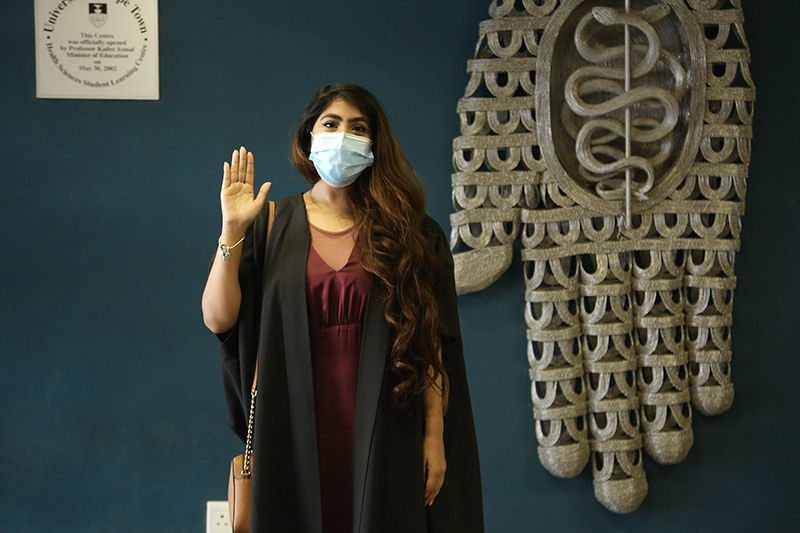
WHO?
The oldest medical school in sub-Saharan Africa (established in 1912), the Faculty of Health Sciences has around 2 600 staff members and 4 900 students (2 118 undergraduates and 2 785 postgraduates in 2020). It’s considered a centre of excellence in teaching, learning and research for health professionals and scientists.
WHAT?
With 13 academic departments comprising 106 divisions, the faculty is committed to addressing the health challenges we face as a society, particularly those affecting Africa.
WOW!
- The world’s first successful human heart transplant was performed in 1967 by Dr Christiaan Barnard, a member of the faculty.
- It’s the top-rated health sciences faculty on the continent, and among the top 100 globally.
- The faculty boasts the most National Research Foundation A-rated researchers at UCT.
- Researchers in the faculty publish more than four peer-reviewed articles every day, on average.
- Health Sciences is home to four out of the top 10 inventors by patents granted at UCT.
WHERE?
Health Sciences campus (adjacent to Groote Schuur Hospital)
021 406 6328
fhs-ug-admiss@uct.ac.za
Faculty of Health Sciences website
Humanities
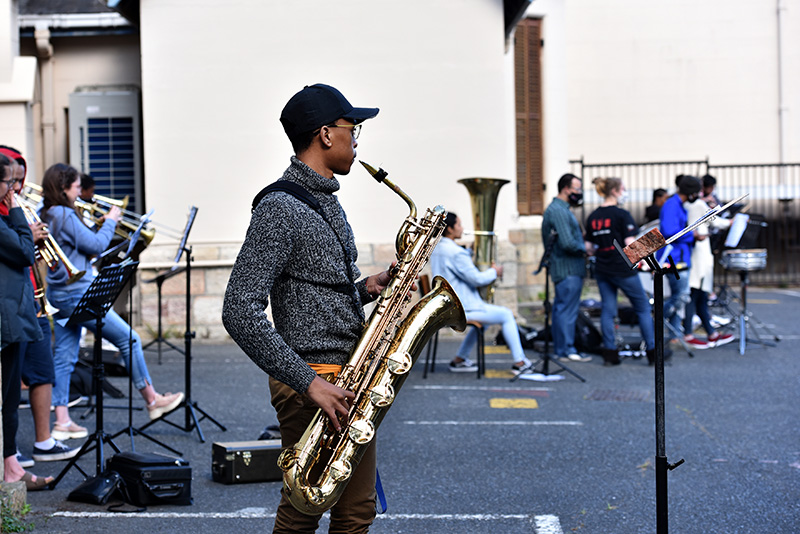
WHO?
With over 7 000 students, this faculty comprises 17 academic departments, located in three main clusters: the Arts, the Social Sciences and the Performing and Creative Arts.
WHAT?
The largest faculty at UCT with 15 research centres and institutes offering 30 academic majors as well as the opportunity to choose from 21 majors offered through other faculties.
WOW!
- The faculty is home to over 80 National Research Foundation-rated researchers and four SARChI Chairs.
- Internationally renowned artists and scholars, such as Pretty Yende, Akin Omotoso and JM Coetzee, have graduated from the faculty.
WHERE?
Upper Campus, Lower Campus, Hiddingh Campus
021 650 2717
hum-ugrad@uct.ac.za
Faculty of Humanities website
Law
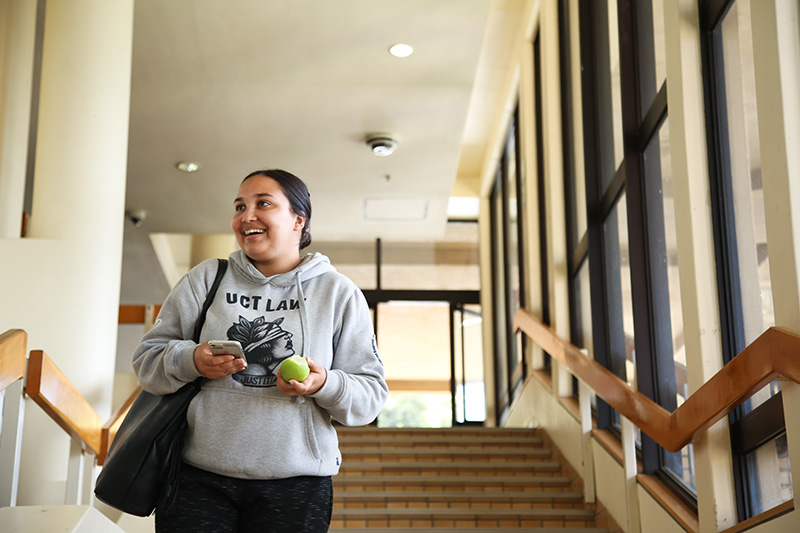
WHO?
Made up of more than 1 200 students (45% postgraduates) and 165 staff, the Faculty of Law was rated in the Top 150 Law Schools in the world by the Quacquarelli Symonds World University Rankings 2020.
WHAT?
The Faculty of Law is the oldest and smallest faculty at UCT. Organised into three departments – Private Law, Public Law and Commercial Law – the faculty is home to world-class research units that provide the bridge between academic endeavour and social responsiveness. The faculty has two community-serving law clinics, one of which is focused on refugee rights.
WOW!
- The faculty is home to over 20 National Research Foundation-rated researchers and four holders of SARChI chairs.
- It has a range of international agreements that support law students to pursue international exchanges.
- A dedicated Moot Court is available for practising mooting skills, while the new Law and Technology hub focuses on legal tech.
- Students are supported by a 24/7 library space and other faculty facilities that help produce graduates who are sought after globally.
- Law alumni include many leading law figures, such as Justice Albie Sachs (former Constitutional Court judge), Justice Kate O’Regan (former Constitutional Court judge) and Advocate Cissie Gool (anti-apartheid political and civil rights leader).
- Two UCT Law alumni served as counsel on either side of what has been called the biggest deal of 2020 in the United States – the purchase of IHS Markit by S&P Global. Trevor Norwitz led for S&P Global Inc., while Louis Goldberg led for IHS Markit Ltd.
WHERE?
Wilfred and Jules Kramer Law Building
021 650 3086
law-studies@uct.ac.za
Faculty of Law website
Science
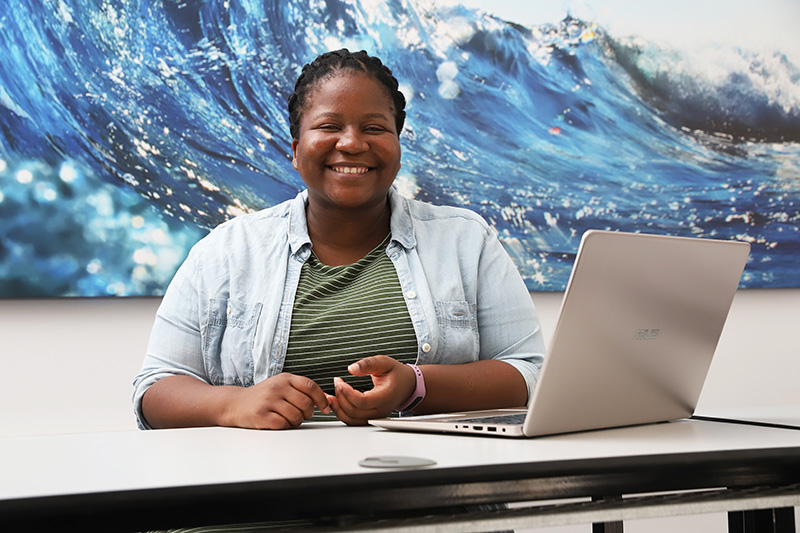
WHO?
With almost 3 500 students and staff, the Faculty of Science continues to contribute to globally relevant research. This includes, but is not limited to, African climate and development, biodiversity, chemistry and biology for health in Africa, marine biology, southern skies and the evolving universe, and human evolution.
WHAT?
The faculty is made up of 12 departments, including archaeology, astronomy, biological sciences, chemistry, computer sciences, environmental and geographical sciences, geological sciences, mathematics and applied mathematics, molecular and cell biology, oceanography, physics and statistical sciences.
WOW!
- Two alumni from the faculty have won Nobel Prizes: Allan MacLeod Cormack received the 1979 Nobel Prize in Medicine – together with Godfrey Hounsfield – for his work on X-ray computed tomography (the CT scanner); Sir Aaron Klug was awarded the 1982 Nobel Prize in Chemistry for his development of crystallographic electron microscopy, which helps us peer into the arrangement of atoms.
- The faculty has 27 international leaders in their field, and our lecturers regularly win the Distinguished Teacher Award.
- Over a third of the university’s annual PhD graduates hail from the Faculty of Science.
WHERE?
PD Hahn, RW James and others
021 650 2712
sci-science@uct.ac.za
Faculty of Science website
Centre for Higher Education Development (CHED)
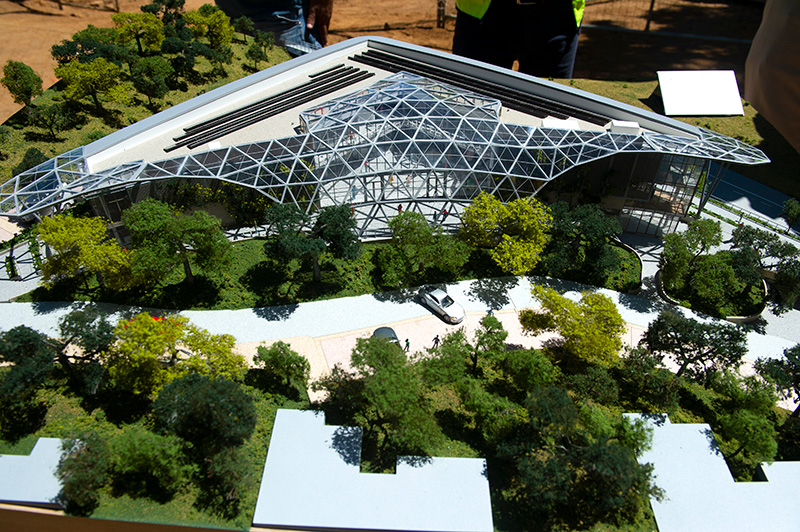
WHO?
CHED is a transversal faculty that works with the other faculties and many units across campus to continually improve access to and quality of higher education, promote excellence through equity, develop curricula in partnership with faculties, support the professionalisation of teaching staff, help students to make informed choices for career planning and readiness for the world of work, and enable systemic improvement through research-led development of informed policies.
WHAT?
CHED comprises a number of entities that collectively contribute to achieving its goals. These include:
- The Academic Development Programme (ADP) – including the Numeracy Centre and the Language Development Group
- The Centre for Innovation in Learning and Teaching (CILT)
- The UCT Careers Service
- The Centre for Educational Testing for Access and Placement (CETAP)
- The Hasso Plattner School of Design Thinking (d-school)
- The First-Year Experience (FYE).
WOW!
- CHED staff are deeply involved with rigorous institutional and national conversations and research in key areas of higher education, including academic advising, academic literacy, curriculum development, work readiness initiatives, educational technology, online and blended learning, assessment and diagnostic testing, numeracy, the first-year experience and multilingualism to improve your university experience,
- The Distinguished Teacher Award has been awarded to several CHED staff over the years, including Associate Professor Janice McMillan (2016), Tim Low (2011) and Carla Fourie (2009).
- The Careers Service has been voted by employers as the “Best Careers Service” for 11 years in a row.
- CILT was awarded the 2020 UCT Vice-Chancellor’s Award for Service Excellence for steering the university’s emergency remote teaching and learning project amid the global COVID-19 pandemic.
WHERE
Huri ǂoaxa (Hoerikwaggo) building
021 650 2645
ched@uct.ac.za
Centre for Higher Education Development website
 This work is licensed under a Creative Commons Attribution-NoDerivatives 4.0 International License.
This work is licensed under a Creative Commons Attribution-NoDerivatives 4.0 International License.
Please view the republishing articles page for more information.






